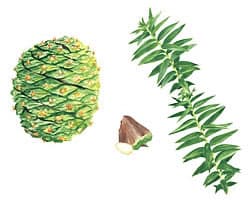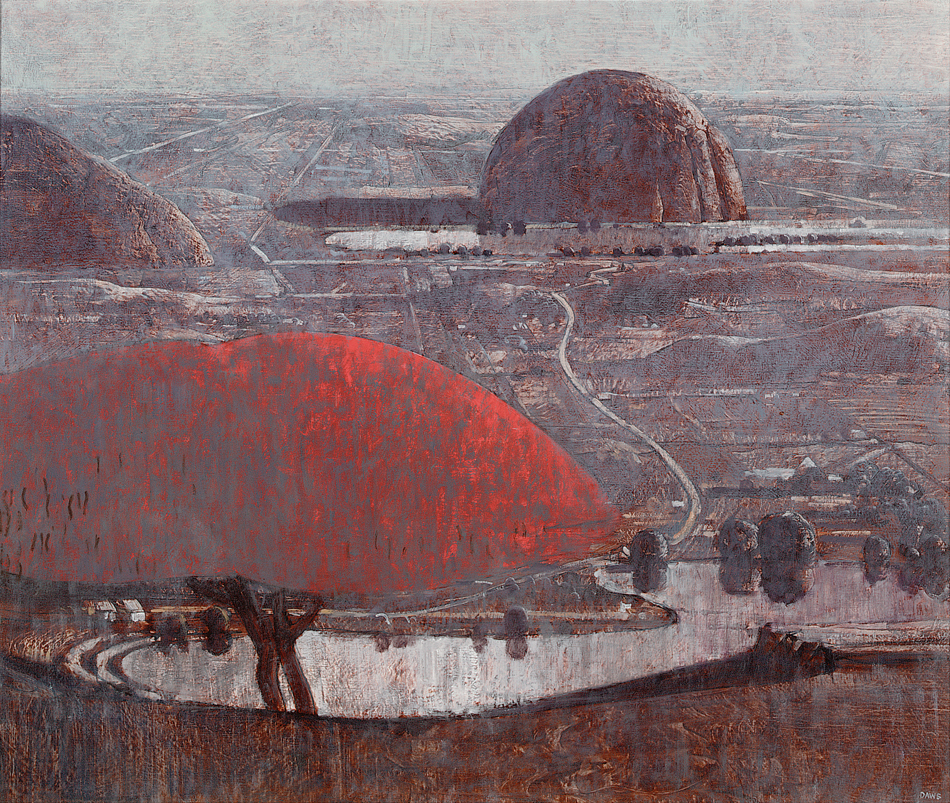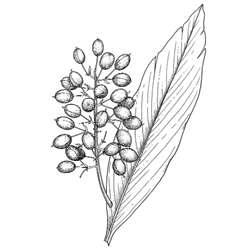This is the wonderful view from the roadside opposite Mary Cairncross Scenic Reserve just outside of Maleny, an hour north of Brisbane. To read a brief history of the traditional owners before and since white occupation click here and on European pioneer history read here. The Glass house mountains were so named because Captain James Cook passing by in the Endevour in May, 1770 thought they looked like the glass-making furnaces near his home in Yorkshire, England.
click on images to enlarge for viewing
The Reserve website has a bushtucker guide which is of particular interest in regard to the Homage to the Seed Blog. The image below is from an article on wild food - also known as bushtucker. The top left corner features the large green bunya pine.

Bunya Pine or Bon-yi Bon-yi
(Araucaria bidwillii)
This was an important food. The nuts were eaten raw although generally roasted whole or after pounding into a meal. Seeds were also buried in mud until they sprouted, then roasted for a better flavour. The thick end was then cracked with a stone, "otherwise it would go off with a pop and shoot everywhere". The trees fruit most abundantly every three to four years. On these years, large numbers of Aboriginal people gathered at nearby Baroon Pocket Dam to feast on these nuts, arrange marriages and initiations, settle tribal disputes and hold corroborees. Some men had usufactory (harvesting) rights to specific trees. Text: reserve website
Photo above taken on walk at Botanic Gardens , Mt Coot-tha in February.
Native Ginger (Alpinia caerulea)
The ginger flavoured pulp of fruits, stems and roots was eaten raw. The leaves were used to wrap around or add flavour when cooking. The fruit was opened and the filament was tasty but the seeds were spat out. Aboriginal pathways through the forest could be detected by the trail of discarded seeds.
(Illustration by Janet Hauser) Text: reserve website
Patricia is one of the volunteers at this Reserve and has been for 13 years.We had an interesting chat when I spent some time there yesterday. Horticulture has been running through her family for quite along time she explained... with family before her orchardists and farmers, she herself sometimes being affectionately known as "the little farmer" and a son in Horticulture. Living close by 2 decades or more the garden at Patrica's home is on an acre - part native garden as she is "devoted to australian natives", part a mix of plants from around the world. There's a dedicated rainforest area and a vegetable garden that I suspect is pretty good. You dont get called 'the little farmer' for nothing! Patricia's face was full of verve and passion as she talked of this garden and her previous one at her home in Nth Ryde, Sydney. I was reminded this part of Sydney was an important food bowl for the early European settlers and she assured me she kept that tradition alive in Ryde.
Our conversation barely skimmed the surface ... I'm sure there would be a lot to learn from this clever woman!
| Callerya megasperma (F.Muell.) Schot | Family Fabaceae - Faboideae |
This is a 'native wisteria' known its likeness in appearance to the well known wisteria originating in Asia. The seedpod and seed above and below were sitting on the desk as I talked with Patricia.

read notes on this species at website: Noosa's Native Plants
PS Through a comment by artist Altoon Sultan I was reminded of the eminant Australian artist Lawrence Daws who has painted the Glass House Mountains often over many years since moving here. Googling his name I found this publication which I'm thinking can be found in the QLD State Library. His own website www.lawrencedaws.com is updated till 2005.


Lawrence Daws Glasshouse Mountains 2001
oil on canvas, 101.5 x 122 cm













2 comments:
I have to admit that what made me go 'wow' is the image of those wacky mountains; I love their beautiful and strange shapes. Of course I went to the Mary Cairncross site to find out how they were made: so interesting. It looks like a gorgeous reserve.
It is a very spectacular and strange view Altoon... Having had reason to drive up this way in the last few months a few times I am getting more and more curious about them and wanting to explore. The seeming randomness of them... strange shapes and spread apart rising suddenly.
There is an artist who's painted them over years I have added to the post prompted by your response...Lawrence Daws.
His last show at Brisbane art dealer Phillip Bacon Galleries contained many works referencing these mountains - but there is no link to work in that show...it was a sell out from what I saw. Glad you found the links helpful...
Thanks for your comments Altoon,
Sophie
Post a Comment